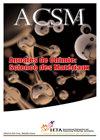Evaluation of Mechanical Parameters of Bacterial Concrete
IF 1.1
Q4 MATERIALS SCIENCE, MULTIDISCIPLINARY
引用次数: 11
Abstract
Received: 25 July 2019 Accepted: 1 October 2019 Conventional concrete is prone to cracking under tensile load, despite its good compressive strength. Recently, biological agents have been applied to heal the cracks in concrete, making concrete structures more serviceable. This paper mainly attempts to evaluate the mechanical properties of bacteria-based self-healing concrete. Two bacteria were selected as the bioagents in concrete, namely, Bacillus subtilis and Bacillus halodurans. The concentration of the bioagents were set to 10~10 cell/mL in water. Then, the two bacteria were applied to cracked concrete to cure the cracks. After curing for several days, the bacteria-based self-healing concrete was subjected to compressive and flexural tests to estimate its mechanical parameters. The results show that the self-healing concretes cured for 14d and 28d had a 7% and 18% higher compressive strength than conventional concrete, respectively; the self-healing concretes cured for 14d and 28d had a 11% and 28% higher flexural strength than the conventional concrete, respectively. Thus, the bioagents could effectively heal the surface cracks on concrete, and make the concrete imperviable.细菌混凝土力学参数的评价
常规混凝土具有良好的抗压强度,但在拉伸荷载下容易开裂。近年来,生物制剂被应用于混凝土裂缝的修复,使混凝土结构的使用寿命更长。本文主要对细菌基自愈混凝土的力学性能进行了研究。选择枯草芽孢杆菌和嗜盐芽孢杆菌两种细菌作为混凝土中的生物制剂。生物制剂在水中的浓度设定为10~10个细胞/mL。然后,将这两种细菌应用于开裂的混凝土中以修复裂缝。在养护数天后,对细菌基自愈混凝土进行了压缩和弯曲试验,以估计其力学参数。结果表明:自愈混凝土固化14d和28d后,抗压强度分别比常规混凝土高7%和18%;自愈混凝土固化14d和28d后,抗弯强度分别比常规混凝土高11%和28%。因此,生物制剂可以有效地修复混凝土表面的裂缝,使混凝土不透水。
本文章由计算机程序翻译,如有差异,请以英文原文为准。
求助全文
约1分钟内获得全文
求助全文
来源期刊

Annales De Chimie-science Des Materiaux
工程技术-材料科学:综合
CiteScore
1.70
自引率
25.00%
发文量
33
审稿时长
>12 weeks
期刊介绍:
The ACSM is concerning the cutting-edge innovations in solid material science. The journal covers a broad spectrum of scientific fields, ranging all the way from metallurgy, semiconductors, solid mineral compounds, organic macromolecular compounds to composite materials. The editorial board encourages the submission of original papers that deal with all aspects of material science, including but not limited to synthesis and processing, property characterization, reactivity and reaction kinetics, evolution in service, and recycling. The papers should provide new insights into solid materials and make a significant original contribution to knowledge.
 求助内容:
求助内容: 应助结果提醒方式:
应助结果提醒方式:


